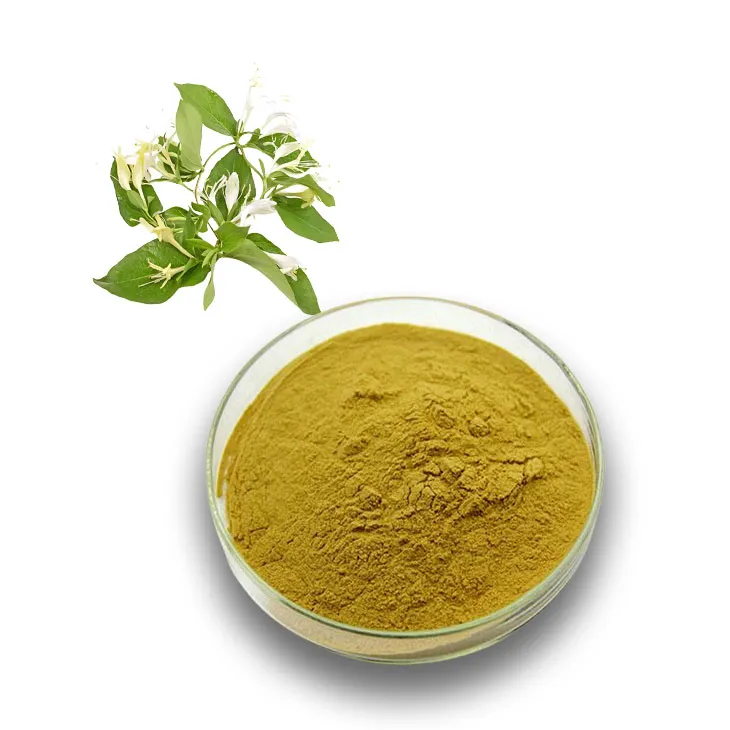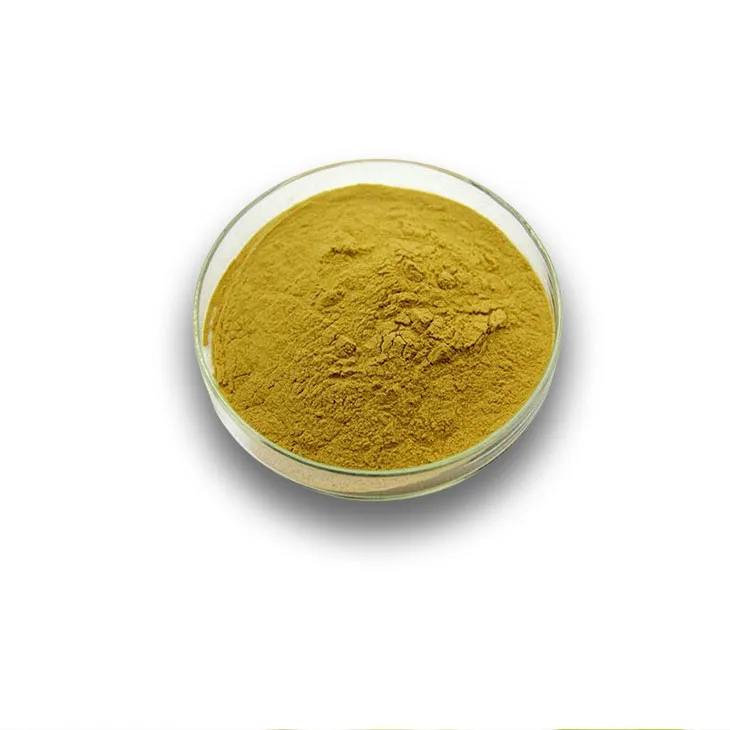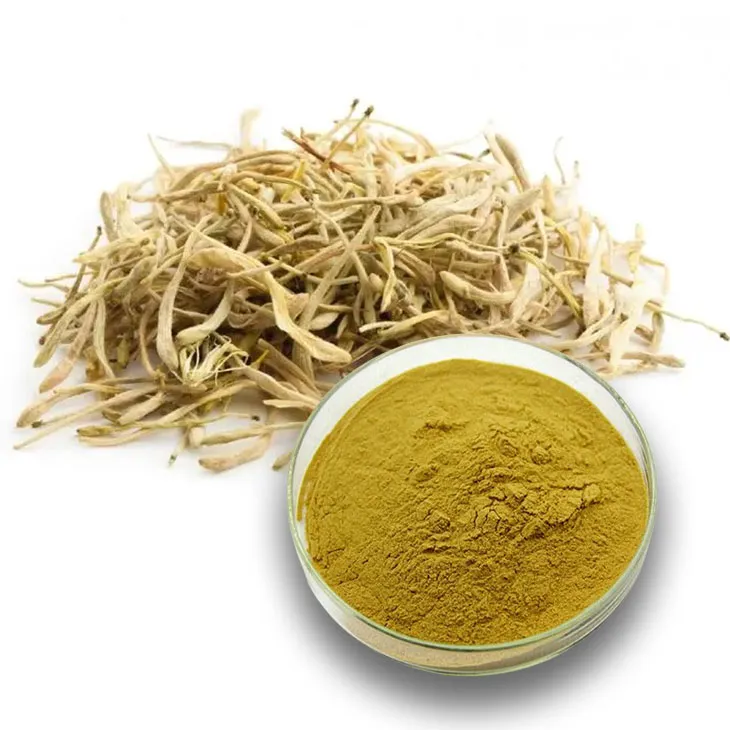- 0086-571-85302990
- sales@greenskybio.com
Have you heard of honeysuckle pollen? Five unexpected health benefits.
2024-11-11

Introduction
Honeysuckle Pollen, often overlooked, is a natural substance with a plethora of potential health benefits. In this article, we will explore five unexpected ways in which Honeysuckle Pollen can contribute to our well - being.

1. Boosting Immunity
Rich in Nutrients: Honeysuckle Pollen contains a variety of nutrients that are essential for a healthy immune system. It is a good source of vitamins, such as vitamin C, which is well - known for its immune - boosting properties. Vitamin C helps stimulate the production of white blood cells, which are the body's first line of defense against infections.
Antioxidant Activity: The pollen also has antioxidant properties. Antioxidants are substances that can neutralize harmful free radicals in the body. Free radicals can damage cells and weaken the immune system over time. By consuming honeysuckle pollen, we can introduce these antioxidants into our body, helping to keep our immune cells healthy and functioning properly.
Immune - Modulating Effects: Studies have suggested that certain compounds in honeysuckle pollen may have immune - modulating effects. This means that they can help regulate the immune response, ensuring that it is neither too weak (allowing infections to take hold) nor too strong (which can lead to autoimmune disorders). This balanced immune response is crucial for overall health.

2. Improving Digestion
Digestive Enzymes: Honeysuckle pollen contains natural digestive enzymes. These enzymes play a vital role in breaking down food into smaller, more easily absorbable components. For example, amylase helps break down carbohydrates, while protease is involved in protein digestion. By supplementing our diet with honeysuckle pollen, we can enhance the efficiency of our digestive process.
Fiber Content: It also has a significant amount of dietary fiber. Fiber is important for maintaining a healthy digestive system. It adds bulk to the stool, preventing constipation and promoting regular bowel movements. Additionally, fiber can act as a prebiotic, feeding the beneficial bacteria in our gut. A healthy gut microbiome is essential for proper digestion, nutrient absorption, and overall immune function.
Soothing the Digestive Tract: Some components in honeysuckle pollen have anti - inflammatory properties. Inflammation in the digestive tract can cause discomfort, pain, and digestive problems. The anti - inflammatory effects of the pollen can help soothe the digestive tract, reducing symptoms such as bloating, gas, and abdominal pain.

3. Relieving Inflammation
Anti - Inflammatory Compounds: Honeysuckle pollen is rich in compounds with anti - inflammatory properties. These compounds can target various sources of inflammation in the body. Whether it is inflammation caused by an injury, an autoimmune disorder, or a chronic disease, honeysuckle pollen may offer some relief.
Reducing Systemic Inflammation: Chronic systemic inflammation has been linked to a wide range of health problems, including heart disease, diabetes, and certain cancers. By reducing systemic inflammation, honeysuckle pollen may help lower the risk of developing these diseases. It can also be beneficial for those already suffering from inflammatory conditions, helping to manage symptoms and improve quality of life.
Joint Health: Inflammation in the joints can lead to pain, stiffness, and reduced mobility. Honeysuckle pollen may be effective in reducing joint inflammation, making it potentially useful for people with arthritis or other joint disorders. It can help improve joint function and relieve pain, allowing for greater ease of movement.

4. Enhancing Skin Health
Antioxidant Protection for the Skin: The antioxidants in honeysuckle pollen can also benefit the skin. Free radicals in the environment can damage skin cells, leading to premature aging, wrinkles, and dull skin. By consuming honeysuckle pollen, the antioxidants can help protect the skin from these harmful effects, keeping it looking youthful and radiant.
Anti - Inflammatory Effects on the Skin: Skin inflammation can cause various skin problems, such as acne, eczema, and psoriasis. The anti - inflammatory properties of honeysuckle pollen can be applied topically or taken internally to help reduce skin inflammation. This can lead to clearer, healthier - looking skin.
Moisturizing and Nourishing: Honeysuckle pollen contains nutrients that can moisturize and nourish the skin. It can help improve the skin's natural barrier function, preventing moisture loss and keeping the skin hydrated. This can result in softer, smoother skin with a more even texture.
5. Other Potential Benefits
Energy Boost: Honeysuckle pollen contains a variety of nutrients that can provide an energy boost. Carbohydrates, proteins, and vitamins in the pollen can be metabolized by the body to produce energy. This can be especially beneficial for those who lead an active lifestyle or need an extra boost during the day.
Stress Relief: Some research suggests that certain compounds in honeysuckle pollen may have a calming effect on the nervous system. Stress can have a negative impact on our overall health, so if honeysuckle pollen can help relieve stress, it can contribute to better well - being.
Detoxification: Honeysuckle pollen may also play a role in detoxification. It can help support the liver and kidneys, which are the body's main organs for filtering and eliminating toxins. By promoting the function of these organs, the pollen can assist in removing harmful substances from the body.
Conclusion
Honeysuckle pollen is a natural substance with many potential health benefits. From boosting immunity to improving digestion, relieving inflammation, enhancing skin health, and more, it offers a range of possibilities for those seeking natural ways to improve their well - being. However, it is important to note that more research is needed to fully understand the mechanisms behind these benefits and to ensure its safety and effectiveness. As with any supplement, it is advisable to consult a healthcare professional before adding honeysuckle pollen to your diet.
FAQ:
Question 1: What is honeysuckle pollen?
Honeysuckle pollen is the pollen grains collected from the honeysuckle plant. It contains various nutrients, including proteins, vitamins, minerals, and bioactive compounds.
Question 2: How does honeysuckle pollen boost immunity?
The bioactive substances in honeysuckle pollen can stimulate the immune system. For example, certain compounds may enhance the function of immune cells like white blood cells, helping the body better defend against pathogens.
Question 3: In what way does it improve digestion?
Honeysuckle pollen may contain enzymes or substances that can aid in the breakdown of food. It can also help regulate the gut microbiota, promoting a healthy digestive environment and improving the overall digestive process.
Question 4: How does it relieve inflammation?
Some components in honeysuckle pollen possess anti - inflammatory properties. They can interfere with the inflammatory pathways in the body, reducing the production of inflammatory mediators and thus relieving inflammation.
Question 5: Can you explain how it enhances skin health?
Honeysuckle pollen may provide nutrients that are beneficial for skin cells. It can also have antioxidant effects, protecting the skin from damage caused by free radicals. This may result in improved skin texture, reduced signs of aging, and a healthier complexion.
Related literature
- The Nutritional and Medicinal Properties of Honeysuckle Pollen"
- "Honeysuckle Pollen: A Potential Source for Health Promotion"
- "Uncovering the Health Benefits of Honeysuckle Pollen Components"
- ▶ Hesperidin
- ▶ Citrus Bioflavonoids
- ▶ Plant Extract
- ▶ lycopene
- ▶ Diosmin
- ▶ Grape seed extract
- ▶ Sea buckthorn Juice Powder
- ▶ Fruit Juice Powder
- ▶ Hops Extract
- ▶ Artichoke Extract
- ▶ Mushroom extract
- ▶ Astaxanthin
- ▶ Green Tea Extract
- ▶ Curcumin
- ▶ Horse Chestnut Extract
- ▶ Other Product
- ▶ Boswellia Serrata Extract
- ▶ Resveratrol
- ▶ Marigold Extract
- ▶ Grape Leaf Extract
- ▶ New Product
- ▶ Aminolevulinic acid
- ▶ Cranberry Extract
- ▶ Red Yeast Rice
- ▶ Red Wine Extract
-
Clove Powder
2024-11-11
-
Panax Ginseng Leaf Extract
2024-11-11
-
Dandelion Leaf Extract
2024-11-11
-
Lavender Extract
2024-11-11
-
Cocoa Extract
2024-11-11
-
Andrographis Paniculata Extract Powder
2024-11-11
-
Bitter Melon Extract
2024-11-11
-
Golden Seal Extract
2024-11-11
-
Camu Camu Extract
2024-11-11
-
Sea buckthorn oil
2024-11-11





















